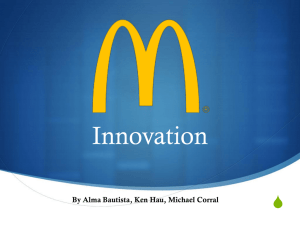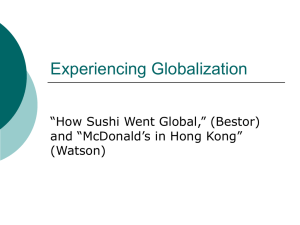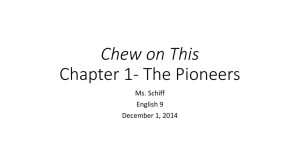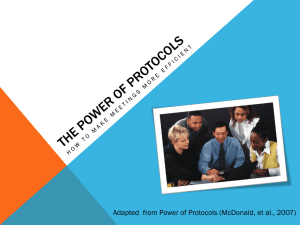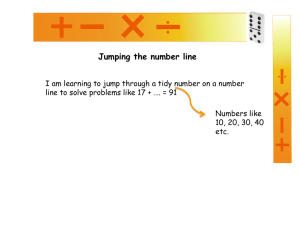Quality, by design
advertisement
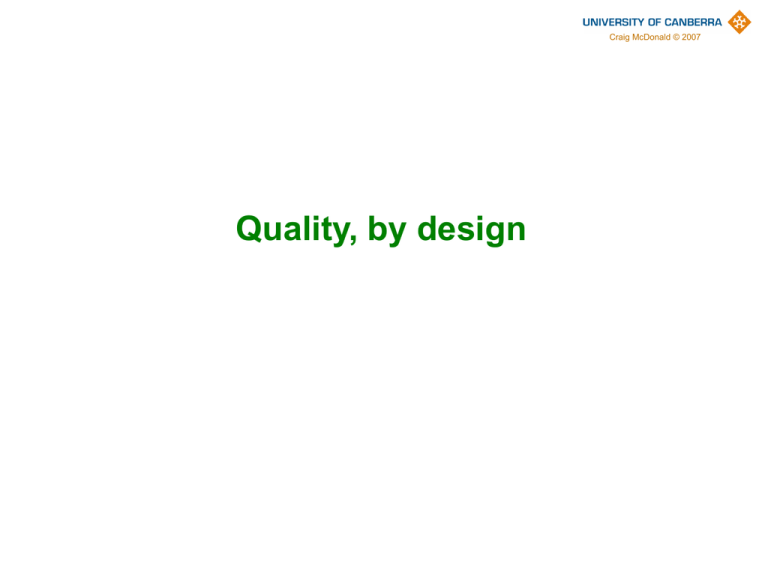
Craig McDonald © 2007 Quality, by design Quality – some views Craig McDonald © 2007 Quality is not a thing-in-itself it is a judgement of the attributes of something Quality =//= QA (Quality Assurance) QA is an part of “professional” work, it is about quality cycle : plan – act – review – learn –plan – act – review …. explicating that we put a ‘floor’ under what we do “evidence-based" work work process, product and impact in terms of work aims (ISO9000) There should be no ‘quality assurance system’ separate from the work itself ACS accreditation: no quality portfolio, very light quality intro with pointers into the quality attributes of the work AUQA ? QA – ‘Professional’ Context Contrast between: amateur, craft, trade, profession In terms of : Qualifications Process Knowledge Creation Knowledge Transfer Organization Codes of Ethics Market activity Craig McDonald © 2007 QA - Education Craig McDonald © 2007 Where the rubber hits the road ? Wiggins, G & J. McTighe (2006) Understanding by Design Merrill p.273 QA - Software Engineering Craig McDonald © 2007 Rubber hits the road Where the rubber hits the road http://www.buzzle.com/editorials/4-5-2005-68117.asp QA – UC T&L Craig McDonald © 2007 CEQ Course DCP CELTS survey Unit outline ? Unit design ? Learning assessment T&L Event Rubber hits the road Where the rubber hits the road http://www.buzzle.com/editorials/4-5-2005-68117.asp Craig McDonald © 2007 ISE Unit Design Team Unit Development: 3 or 4 academics - to provide a sounding board, backup, a succession path, a quality check (eg. on subject scope), etc. Unit Design: (complements the unit outline) 1. Time: How students will spend 150 hours (3cp) estimate how much time you expect the normal student to spend in order to get a credit grade. Included in your estimate would be class contact, tutorial preparation time, assignment creation, study, self-paced lab time, etc. 2. Scholarship: How your unit is based in either in current research and/or current professional practice. As our unit designs develop we should start to explicitly say what 'warrant' the knowledge being presented has - it may be based in particular research articles or projects, Australian Standards, case studies with external partners (like ABS) or our own experiences, consultancies, etc. 3. Relevance: What industry contact & participation happens in the unit. 4. Use of ICT: What IT is being used, both for content (eg modeling tool in SAM) and for teaching (eg. WebCT) 5. Teaching: What pedagogical techniques are being tried or used. 6. Generic Skills: How the design of the unit satisfies the generic skills specified at http://teaching.ise.canberra.edu.au/acs/ 7. QA: How the learning outcomes are met and specifically assessed. Information Systems Projects Craig McDonald © 2007 Project 1 2 analysis options 3 4 requirements spec. design build design spec. 4 broad Designs & evaluation accept system implement Human Activity System input/output feedback Where the rubber hits the road QA – Information Systems Governance Craig McDonald © 2007 Investment Decision Management: time, scope, cost, milestones, people Benefit Realisation plan review monitor PROCESS: Resources Development Context: staff knowledge - attitudes policy / procedures / standards history (precedents) tools & Techniques PRODUCT system of which the task is a part organization / power structures responsibility / authority culture & networks Development task (eg. ‘Design’) product specification Fitness for Use for stakeholder: What do they do with it? Impact on them ? Quality 1 2 3 QA – T&L Systems Governance Craig McDonald © 2007 Investment Decision Management: time, scope, cost, milestones, people Benefit Realisation plan review monitor PROCESS: Resources Development Context: staff knowledge - attitudes policy / procedures / standards history (precedents) tools & Techniques PRODUCT system of which the task is a part organization / power structures responsibility / authority culture & networks Teaching activity product specification Fitness for Use for Students: What do they do with it? Impact on them ? Quality 1 2 3 QA – Influences & improvements Governance Craig McDonald © 2007 Investment Decision Management: time, scope, cost, milestones, people Benefit Realisation plan review monitor PROCESS: Resources Development Context: staff knowledge - attitudes policy / procedures / standards history (precedents) tools & Techniques PRODUCT system of which the task is a part organization / power structures responsibility / authority culture & networks Teaching activity product specification Fitness for Use for Students: What do they do with it? Impact on them ? Quality 1 2 3 Quality, by design Craig McDonald © 2007 Quality Audits: Australian Computer Society Accreditation AUQA audit Quality Ideas from: Software Engineering Information Systems Education Quality =//= Quality assurance subjective quality – organized QA QA must be a part of, not an addition to, action (where the rubber hits the road) The ISE ‘unit design’ a QA measure on the design side potential to demonstrate the actualization of UC policy, good practice, meeting aims, etc…

